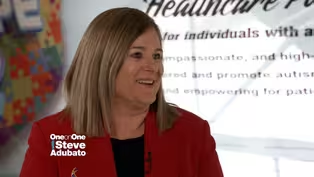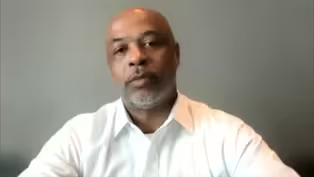One-on-One
NJDOT Commissioner Talks Congestion Pricing
Clip: Season 2023 Episode 2632 | 9m 38sVideo has Closed Captions
NJDOT Commissioner Talks Congestion Pricing
Diane Gutierrez-Scaccetti, Commissioner of the New Jersey Department of Transportation (NJDOT), sits down with Steve Adubato to discuss COVID’s impact on NJ Transit, congestion pricing, and NJDOT’s new programs.
Problems playing video? | Closed Captioning Feedback
Problems playing video? | Closed Captioning Feedback
One-on-One is a local public television program presented by NJ PBS
One-on-One
NJDOT Commissioner Talks Congestion Pricing
Clip: Season 2023 Episode 2632 | 9m 38sVideo has Closed Captions
Diane Gutierrez-Scaccetti, Commissioner of the New Jersey Department of Transportation (NJDOT), sits down with Steve Adubato to discuss COVID’s impact on NJ Transit, congestion pricing, and NJDOT’s new programs.
Problems playing video? | Closed Captioning Feedback
How to Watch One-on-One
One-on-One is available to stream on pbs.org and the free PBS App, available on iPhone, Apple TV, Android TV, Android smartphones, Amazon Fire TV, Amazon Fire Tablet, Roku, Samsung Smart TV, and Vizio.
Providing Support for PBS.org
Learn Moreabout PBS online sponsorship(upbeat music) - We're joined by the commissioner of the Department of Transportation, Diane Gutierrez-Scaccetti, who is dealing with a very complicated set of transportation issues.
Commissioner, good to have you with us.
- Thank you.
Nice to be here, Steve.
- Could you do the New Jersey Transit situation first?
You're not the head of New Jersey Transit, but you're engaged and involved, correct?
- Right, I'm the chair of the board of directors of New Jersey Transit.
- How are we doing there?
- As you know, we're facing some financial issues that are consistent with our transit peers across the country.
As one of the few statewide transit agencies, our problem is a little bigger than others, but we are going to work hard in the next several months to come up with a plan, hopefully to help cut some of our costs and tighten our belts, and then look at new ways to find revenue streams that are sustainable for New Jersey Transit.
But again, facing a very similar issue as many transit agencies across the country as the federal COVID relief money kind of runs out and that program comes to an end.
- Commissioner, as you talk about COVID money from the federal government, the impact of COVID on mass transit has been extraordinary.
Please talk about it.
- It has.
Riders are still not back to normal schedules.
Partly due to the fact that I think there's still some hesitancy to use the public transit system, but also because offices are now working much more of a hybrid schedule.
So folks aren't going to their offices every day like they once did, and then in turn not using the mass transit system.
We're not sure how that will play out long term, but part of our activity now will be looking at how we provide a service realignment that better matches up with the demand that has been created post-COVID.
- When you say realignment, are you talking about what?
- Well, looking at where our higher demand lines are versus some of our lower lines.
Not cutting service, but perhaps suggesting service to make sure that we're in the right place at the right time for those who really depend on New Jersey Transit every day.
And certainly looking towards perhaps the ability to use some other mechanisms like micro-transit where we have a little lower ridership and we can perhaps provide transit through a different mechanism.
We think it's really time for us to take a hard look at that.
And some folks have said, why haven't you to date?
But if you think about the time that's passed, the five and a half years, when Governor Murphy came in we were entirely focused on PTC.
- PTC meaning?
- Positive Train Control.
If you remember, at that time, positive train control and the federal deadlines was really the biggest focus that we had because of the impacts of not meeting the federal deadline.
We've gotten through that just as COVID came on.
COVID changed our world exponentially.
And now as we are back into some what I'll call some relative normalcy, we're adjusting to what are the new hybrid schedules people are working and the new demands of businesses to just have a different model.
Stores are open different hours.
They don't stay open as late.
They may open later in the morning.
Businesses, offices, a lot of them have hybrid programs, so we have to adjust with that.
- Commissioner, to what degree do you have conversations with the transportation officials in New York City as it relates to congestion?
You know where I'm going.
I mean, you got folks in northern New Jersey, central Jersey who go across whatever, whether it's the tunnel, the bridge or whatever it is and they're thinking, "Are you kidding me?
"Are you serious?
"You're gonna hit us and it's congestion pricing?"
And you've got Josh Gottheimer, Congressman Gottheimer, who we'll have on soon talking about it and others, do you talk to them and say, "Hold on, time out.
"Can we have a conversation?"
Or is it that's what they're gonna do 'cause they can do it?
- Well, as far as relationships in New York go, I'm very happy that I have what I consider to be good relationships with members of Governor Hochul's team.
Congestion pricing is really being driven by the MTA and regrettably- - Metropolitan Transit Authority?
- Correct.
- Yeah, but respectfully doesn't that board answer to the governor?
- It does, but I also think some of this started before Governor Hochul came into office and the legislation for congestion pricing was certainly passed before that.
But, so it makes it a little complicated, Steve.
A lot of things happened under Governor Cuomo.
There's a piece of legislation in New York that mandates congestion pricing and regrettably, it mandates it based on a revenue target as opposed to congestion relief.
And so, the toll piece, the congestion pricing piece is being driven to meet that target.
I do hope over the course of the next 20 days or so we can have some substantive conversations with New York that the Traffic Mobility Review Board, who will be the board that actually sets the pricing policy, we have written to them and ask them to consider our concerns for New Jersey Transit buses, for our riders, for toll credits to be provided.
But time will tell and the best way for us to handle this is to continue to make New Jersey's case.
The governor has been very clear that he's not going to sit still for this, for raising money for New York MTA on the back of New Jerseyans.
And we will do what's necessary to make sure that our voices are heard.
- Speaking about raising money, in the minute we have left, the 2024 budget, right?
The budget moving forward struck on the last day of June, we're taping this at the end of May.
Highest priorities from a transportation perspective in that budget are, Commissioner?
- Really just the continued support of the Capital Transportation Trust Fund and the department's capital program.
We have significant program based on the federal IIJA funding that we've received.
- What's that?
- The IIJA is the Investment and Infrastructure Jobs Act.
That was part of the bipartisan infrastructure law passed by Congress and signed by the President in November of '21.
And we are in our second year of that.
It gives New Jersey about 300 million more a year in capital investment for our traditional road projects.
And then we have another 200 million that is specifically dedicated to bridges.
And so the department is working very hard to program every dollar of federal money to make certain that we can spend everything we get in addition to applying for grants.
So the continued support that transportation gets from the governor specifically and also from the legislature is incredibly important to New Jersey making certain that our state of good repair on our roadways makes our economy go, makes our quality of life better.
And you know lots of people are gonna be heading to the shore over the weekend for the start of the summer season.
- We're doing this right before Memorial Day Weekend.
Go ahead, I'm sorry.
- Yeah, right before Memorial Day.
So, we wanna make sure our roads and bridges are always in good condition.
People get a smooth ride.
Our commercial traffic has access to the ports and airports that they need to continue to make New Jersey economically successful.
And so, that capital plan that they approve for us is meaningful.
We'll be going to them with some other legislation.
We hope to really improve safety.
Fatalities is a huge issue that DOTs across the country is facing.
We had a real pivot in COVID with high speeds, but I have to give a shout out to New Jersey State Police.
In my travels I see them out on the road really doing speed and enforcement, which is critical to the success of any safety program.
So, working in partnership with them, I believe that New Jersey can really improve safety for our motorists and for our pedestrians and bicyclists, as well.
- Commissioner, thank you.
We appreciate your time.
- You're very welcome.
- I'm Steve Adubato.
That's the commissioner.
We'll see you next time.
- [Narrator] One-On-One with Steve Adubato has been a production of the Caucus Educational Corporation.
Funding has been provided by The Port Authority of New York and New Jersey.
The Healthcare Foundation of New Jersey.
Prudential Financial.
The Russell Berrie Foundation.
PSE&G, RWJBarnabas Health.
Let'’s be healthy together.
New Jersey Institute of Technology.
PSEG Foundation.
And by NJM Insurance Group.
Promotional support provided by Insider NJ.
And by Northjersey.com and Local IQ.
NJM Insurance Group has been serving New Jersey businesses for over a century.
As part of the Garden State, we help companies keep their vehicles on the road, employees on the job and projects on track, working to protect employees from illness and injury, to keep goods and services moving across the state.
We're proud to be part of New Jersey.
NJM, we've got New Jersey covered.
Michele Adubato Talks About Supporting the Autism Community
Video has Closed Captions
Clip: S2023 Ep2632 | 9m 2s | Michele Adubato Talks About Supporting the Autism Community (9m 2s)
Reducing Violent Crime for Youth in Newark
Video has Closed Captions
Clip: S2023 Ep2632 | 9m 39s | Reducing Violent Crime for Youth in Newark (9m 39s)
Providing Support for PBS.org
Learn Moreabout PBS online sponsorship
- News and Public Affairs

Top journalists deliver compelling original analysis of the hour's headlines.

- News and Public Affairs

FRONTLINE is investigative journalism that questions, explains and changes our world.












Support for PBS provided by:
One-on-One is a local public television program presented by NJ PBS

